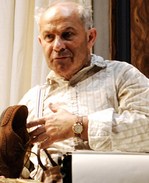SITE GUIDE
SEARCH
REVIEWS
REVIEW ARCHIVES
ADVERTISING AT CURTAINUP
FEATURES
NEWS
Etcetera and
Short Term Listings
LISTINGS
Broadway
Off-Broadway
NYC Restaurants
BOOKS and CDs
OTHER PLACES
Berkshires
London
California
New Jersey
DC
Philadelphia
Elsewhere
QUOTES
TKTS
PLAYWRIGHTS' ALBUMS
LETTERS TO EDITOR
FILM
LINKS
MISCELLANEOUS
Free Updates
Masthead
Writing for Us
A CurtainUp  London Review
London Review
 London Review
London ReviewMoonlight and Magnolias
|
To stay in business you have to give them what they want, not what’s good for them.— David O. Selznick
|

Nicholas Wooodeson as Ben Hecht
(Photo: Mike Eddowes) |
Hutchinson, who for many years did rewrites for the movie industry was fascinated by this event was part of the making of what went on to become arguably the greatest movie of all time. Hutchinson also explains in the programme that he wrote Moonlight and Magnolias as a tribute to Selznick and producers everywhere, who have the imagination and persistence to make something happen. As Selznick put it, "Hitler couldn’t take the pressure of running a studio!"
Although much of the play is a farce as banana skins and peanut shells and screwed up paper start to litter the stage, Hutchinson has plenty of serious stuff to say as well. There are those allusions to the political state in Europe with the rise of Fascism in the 1930s. He talks about resentment in the industry whereby writers get paid first, no matter what the outcome of the project.
There is discussion of the tensions between writer, producer and director. The Jewish writer, Ben Hecht (Nicholas Woodeson) objects to Scarlett slapping the maid for lying about her "birthing" experience and calls the whole project "an elegy to the Old South". As Elyse Sommer explained when reviewing the New York production, because we know the finished product so well, the recreation of the scenes improvised by Selznick (Andy Nyman) and Fleming (Steven Pacey) while Hecht is tied to the typewriter works very well indeed. And because we know its later importance, Ben Hecht’s objection to the prosaic quality of the iconic phrase, "Tomorrow is another day!" is hysterical. This phrase sends him off crying to the john.
We delight at how that other famous saying comes about with the addition of the "Frankly" to the novel’s "My dear I don’t give a damn!" They talk about identity and being Jewish and/or American and Hecht demonstrates this to Selznick by phoning colleagues and asking them which they think he is.
There is much physical comedy derived from the scenes from the book being acted out. A round food cover serves as an impromptu pregnancy costume. As Fleming lies on the floor pretending to be Melanie Wilkes giving birth with Selznick as Scarlett helping the delivery, we are in a state of high mirth. Hecht and Fleming contemplate making an escape while Selznick has left them in charge of the keys but then decide against it.
The set is brimming over with mock walnut and a few genuine 1930s pieces. The elegant suits and fresh shirts become soiled as the men look increasingly unkempt and unshaven.
The performances here are very stylish. Nicholas Woodeson’s great intelligence as the writer Hecht, Andy Nyman showing Selznick’s insecurity as a producer living up to his father-in-law, Louis B Mayer and Victor Fleming who was to have two hits that year with The Wizard of Oz and Gone with the Wind. Rebecca Calder provides support as Miss Poppenguhl who starts the play as an elegant fashion icon but ends dishevelled. Sean Holmes seems to be a director to watch – looking back at his productions he doesn’t put a foot wrong. Do try to catch this wonderful comedy at the Tricycle in the next few weeks.
|
Moonlight and Magnolias
Written by Ron Hutchinson Directed by Sean Holmes Starring: Nicholas Woodeson, Steven Pacey, Andy Nyman With: Rebecca Calder Design: Francis O’Connor Lighting: Davy Cunningham Sound: Carolyn Downing Running time: Two hours with one interval Box Office: 020 7328 1000 Booking to 2nd August 2008 Reviewed by Lizzie Loveridge based on 10th July 2008 performance at The Tricycle Kilburn High Road, London NW6 (Tube: Kilburn) |
|
REVIEW FEEDBACK Highlight one of the responses below and click "copy" or"CTRL+C"
Paste the highlighted text into the subject line (CTRL+ V): Feel free to add detailed comments in the body of the email and state if you'd like your comments published in our letters section. |
|
London Theatre Tickets Lion King Tickets Billy Elliot Tickets Mighty Boosh Tickets Mamma Mia Tickets We Will Rock You Tickets Theatre Tickets |




